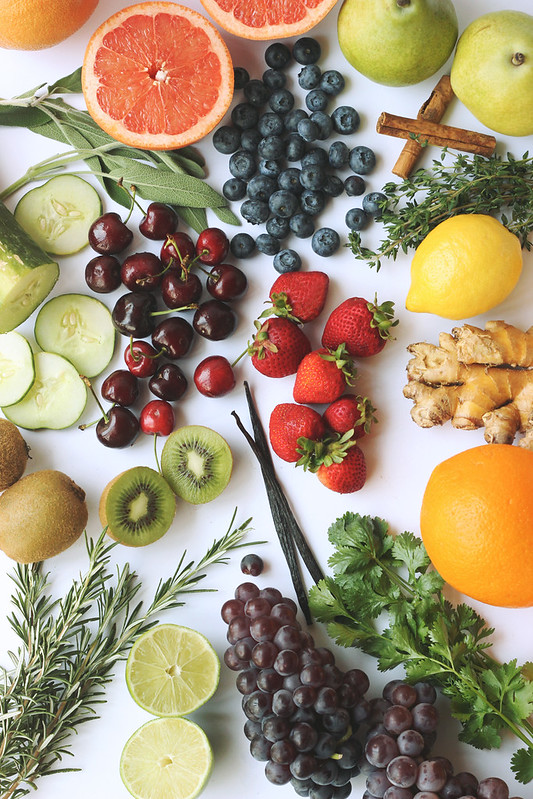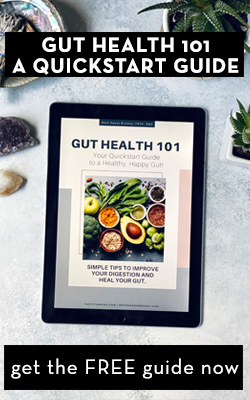Digestive dysfunction is easily the most common chronic ailment I encounter working as a Nutritional Therapist. As a follow-up to my in-depth series Digestion 101, I wanted to offer five, simple actionable steps that you can take right away to immediately begin the improvement of your digestion.
Digestive dysfunction can have many faces – gas, bloating, stomach aches, indigestion – we’ve all been there. Yes, there are plenty of quick-fix, short term “bandaid” approaches to managing the symptoms, I see so many people that often pop antacids, take anti-gas, diarrhea or constipation meds just to get through the day. Sadly this only manages the symptoms of a larger problem and more often than not the root cause of the dysfunction is left untreated and the problems still persist.
Rather than popping pills or difficult, unnatural approaches, here are 5 simple, meal-time tips to improve your digestion, naturally.
5 Mealtime Tips to Improve Digestion

1) Prepare Your Digestion
15-30 minutes prior to mealtime, drink a mug of warm lemon water, take a little apple cider vinegar in some water or take a digestive bitters.
These all work by stimulating the production of gastric juices that are imperative to digestion, like stomach acid which disinfects the food and aids in the protein breakdown, digestive enzymes, which work to break down protein into usable nutrients and bile, which helps digest fats. When food isn’t properly broken down carbs ferment, fats rancidify and proteins putrefy. YUCK!
2) Eat Calmly
Digestion is a north to south process and it actually begins in the brain. Avoiding eating while standing or driving. Remove phones, turn off the tv, and stay calm. Before your first bite of food take 5 to 10 slow, deep mindful breaths, to begin the switch of your nervous system.
If our brain isn’t in a relaxed, parasympathetic mode, it cannot actually send the signal to the rest of our digestive system to do it’s varying jobs and most will cease to function at all. When we are eating on-the-go, in a stressed, fight or flight mode (sympathetic), functions that are not immediately essential (like the digestive system, immune system, etc) are typically shut down, to some degree.
This means, before any foods are ingested, before you get obsessed with supplements to aid in digestion, or take on any of these tips, none of this will even matter if none of the rest of the system is triggered to properly work – all because you are eating in a state of stress.
3) Chew your Food
Simply put, imagine the additional load you are putting on your stomach by expecting it to break down large hunks of unchewed food. Shoot for 30-50 chews per every bite of food. Setting your fork down between each bite also helps to slow you down and encourages adequate chewing.
Our mouth, our teeth and our salivary enzymes play a very important role in the breakdown and digestion of our foods, especially carbohydrates. If this unchewed food continues to travel south to your stomach, you are putting a larger burden on your stomach. Additionally this lack of chemical breakdown, can also leave the pancreas and it’s pancreatic amylase and the small intestines more work to do later on. If the small intestines cannot handle the large amount of undigested starch, it will then enter the colon. This excess starch can feed candida and cause general dysbiosis in the digestive tract.
Read more about the mouth and the important roles that it plays in digestion.
4) Fruit at Meals
Fruit offers tons of nutrients and vitamins but it’s best to avoid fruit or other sweets for at least an hour after eating a heavy meal.
If you eat fruit (or any sugar) after a bigger meal that requires more in-depth digestion, as your digestion takes the large meal that was just consumed, the fruit sugar will remain for too long in your stomach and it will begin to ferment, which can lead to indigestion, gas and bloating.
5) Stay Hydrated But Don’t Guzzle
Be sure to stay hydrated throughout the day, which can improve your body’s ability to properly digest foods, but always avoid guzzling water while eating.
Excess water (or any fluids) at mealtime can dilute your gastric juices, like stomach acid and enzymes. Without these very important, key elements, your digestion can become sluggish and slowed, foods will not be properly broken down and this can lead to gas and bloating.
So remember, just keep it simple. With a little planning, eating calming, and knowing what to avoid, you can start to improve your digestion at your very next meal. It’s as easy as that.
To read more about digestion check out my in-depth series: Digestion 101













4 Responses
Starting my day with a warm glass of water with lemon and apple cider vinegar has definitely made a huge difference!
I also drink lemon water quite a bit. I know its good for me but I just think it tastes good vs. plain water. 🙂
Hi Beth!
I, too, love water with lemon and apple cider vinegar. I never thought about eating fruit with meals though. I tend to eat them whenever so I appreciate this tip. I’ve had a sensitive stomach for as long as I can remember. Taking a probiotic daily really seems to help. Thanks for the great article!
Thanks for the practical suggestions to improve once digestion. They’re really very helpful. Thanks again for putting them together.